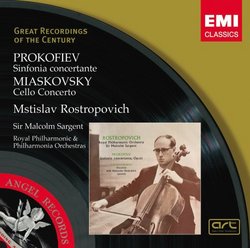| All Artists: Sergey Prokofiev, Nikolay Myaskovsky, Sergey Rachmaninov, Malcolm Sargent, Royal Philharmonic Orchestra, Philharmonia Orchestra of London, Alexander Dedyuhkin Title: Prokofiev: Sinfonia Concertante; Miaskovsky: Cello Concerto Members Wishing: 0 Total Copies: 0 Label: EMI Classics Release Date: 3/6/2007 Album Type: Original recording remastered Genre: Classical Styles: Forms & Genres, Concertos, Historical Periods, Modern, 20th, & 21st Century, Instruments, Strings, Symphonies Number of Discs: 1 SwapaCD Credits: 1 UPC: 094638001225 |
Search - Sergey Prokofiev, Nikolay Myaskovsky, Sergey Rachmaninov :: Prokofiev: Sinfonia Concertante; Miaskovsky: Cello Concerto
 | Sergey Prokofiev, Nikolay Myaskovsky, Sergey Rachmaninov Prokofiev: Sinfonia Concertante; Miaskovsky: Cello Concerto Genre: Classical
|
Larger Image |
CD Details |
CD ReviewsBeautiful Doc Holliday | Great Northwest | 05/03/2007 (5 out of 5 stars) "Funny, how we love to critize the great ones, and God, was Mstislav Rostropovich a great one! His passing has left me depressed and listening to all my recordings of his work. This particular CD has become one of my repeatedly, played favorites. The Prokofiev "Sinfonia Concertante" is pure magic, the Miaskovky "Cello Concerto" is beautifully enchanting and the Rachmaninov "Vocalise" bonus is sublime. A steal for the price." The passing of a giant Thomas Martin | USA | 05/10/2007 (5 out of 5 stars) "Like the other reviewer, its hard to imagine a world (musical or otherwise)without Rostropovich, and although he made many great recordings, the Miaskovsky concerto is one of his best. For those who aren't familiar with the piece, it is achingly beautiful (along with the composer's violin concerto). Needless to say, Slava's Prokofiev was authoritative. A must purchase CD!" Early Rostropovich Robin Friedman | Washington, D.C. United States | 07/07/2009 (5 out of 5 stars) "I became familiar with the beautiful cello concerto by Nicolai Miaskovsky (1881 -- 1950)on a budget-priced release on Arte Nova with the gifted Kyrill Rodin as cellist and Konstantin Krimets conducting the Russian Philharmonic. I loved the piece and wanted to hear it performed by the late Mstislav Rostropovich (1927 -- 2007). Rostropovich recorded Miaskovsky's concerto in 1955, his first recording for the EMI label, with Sir Malcolm Sagent and the Royal Philharmonic & Philharmonia Orchestras. The recording has been reissued as part of EMI's "Great Recordings of the Century" series. The recording also features Prokofiev's Sinfonia Concertante in e minor, opus 125. This recording is available at a price little above that of the Arte Nova recording. Rostropovich's reading of this music is incomparable.
Miaskovsky is known primarily for his 27 symphonies, all of which have been recorded, and for the Cello Concerto in c minor, which he composed in 1946, late in his career. Miaskovsky had a troubled relationship with the Soviet regime, but this work was one of six of the composer's compositions to receive the Stalin Prize. Rostropovich became a champion of this concerto, and he was the dedicatee of a cello sonata Miaskovsky composed in 1950. (The sonata appears on the Arte Nova CD mentioned above and has also been recorded elsewhere.) Miaskovsky's two movement cello concerto has an immediate appeal with its lyricism and pervading moood of sadness. The music is, for the most part, slow in tempo with passionate melodic lines. The work moves back deliberately to an earlier, late romantic musical expression with little if any modernistic traces. Indeed the score seems to constitute a challenge to modernism in favor of a return to a music of the heart. There is little of the virtuosic or the intellectualized in this piece. With its nostalgia,, tone, and Russian folk character, Miaskovsy's concerto was a work made for Rostropovich. His playing here captures the long lines and sad reflectiveness of this music. In its second movement, Miaskovsky's concerto alternates fast, intense sections with slower, reflective material. The Rodin/Krimets reading of this work takes 22 minutes over this movement, which makes it somewhat diffuse and overlong, while Rostropovich/Seargant take a much more effective and compressed 17 minutes. The entire work has a strongly integrated character as the mood of the opening measures comes back to end the concerto. Prokofiev's Sinfonia Concertante in E minor, Opus 125 is a much more modernistic piece. It was composed in 1948 and based in large part on Prokofiev's earlier Cello concerto, opus 58. The work was written for Rostropovich, who premiered it and recorded it several times during his career. Opinions differ about this piece. It is written in a mixture of styles with a lyricism that resembles that of his dear friend Miaskovsky in places and with a sharp, sardonic and biting quality elsewhere. The work is highly angular and moves quickly from mood to mood. Reluctantly, I found this work somewhat disjointed and overlong, especially in the highly extended second movement. The orchestration has some highly imaginative writing, especially for brass, percussion, and celeste. And Rostropovich brings passion to the expressive and virtuosically demanding cello part. For all its complexity and brilliance, this work does not engage my feelings in the way that Miaskovsky's concerto does. The CD concludes with a stunningly impassioned reading of Rachmaninov's famous "Vocalise" with pianist Alexander Dedyukhin accompanying Rostropovich. Those who love Rostropovich or Russian music will want this recording. The major attraction for me was the performance of Miaskovsky's concerto. Robin Friedman" |

 Track Listings (6) - Disc #1
Track Listings (6) - Disc #1